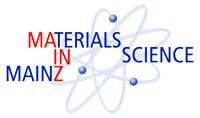


Physikalisches Kolloquium
Dec. 16, 2003 at
5 p.m. c.t.
in
Hörsaal des Instituts für Kernphysik, Becherweg 45
Prof. Dr. Alfons Weber
Institut für Physik
a.weber@uni-mainz.de
Prof. Dr. Hartmut Wittig
Institut für Kernphysik
hartmut.wittig@uni-mainz.de
On the Development of New Proton Conducting Separator Materials for Hydrogen and Methanol Fuel Cell Applications
Prof. Dr. Klaus-Dieter Kreuer (Max-Planck-Institut für Festkörperforschung, Stuttgart)
The direct conversion of chemical into electrical energy by means of a fuel cell is conceptually highly appealing, but materials problems still prevent the development of competitive fuel cell systems. Many of these problems are related to the lack of appropriate electrolyte materials, that conduct ions (e.g. O2-, OH-, H3O+, H+, CO32-) at a high rate and that separate the reactants (e.g. hydrogen rich gases and air) in temperature ranges, where appropriate electrocatalysts for the envisaged electrochemical reactions are available. This presentation provides:
(i) insight into the elementary transport reactions of protons and other species in proto-type proton conductors on a molecular, mesoscopic and macroscopic scale as obtained by experiments (e.g. dielectric spectroscopy, E- and PFG-NMR) and simulations (e.g. CP-MD), (ii) strategies for the development of novel proton conducting electrolytes and (iii) a few promising candidates comprising hydrated proton conducting polymers with low Onsager cross-coefficients for the coupled transport of protons and water or methanol by microstructural control. (These materials are relevant for direct methanol fuel cells (DMFC) , for which the so-called methanol and water "cross-over" is still the key problem to be solved.), novel functionalized side-chain polymers with high proton conductivity at medium temperatures (150-250°C), where poisoning effects of available electrocatalysts (e.g. Pt/Rh) are drastically reduced and even non-nobel metal catalysts may be used. As opposed to conventional membranes, the high proton mobility in these materials does not rely on the presence of water (high relative humidity), i.e. no active water or methanol management is required. Also heat rejection is easier in this temperature range, and proton conducting oxides with high thermodynamic stability for operation in medium temperature (500-700°C) solid oxide fuel cells (SOFC) with dry methan as a fuel.